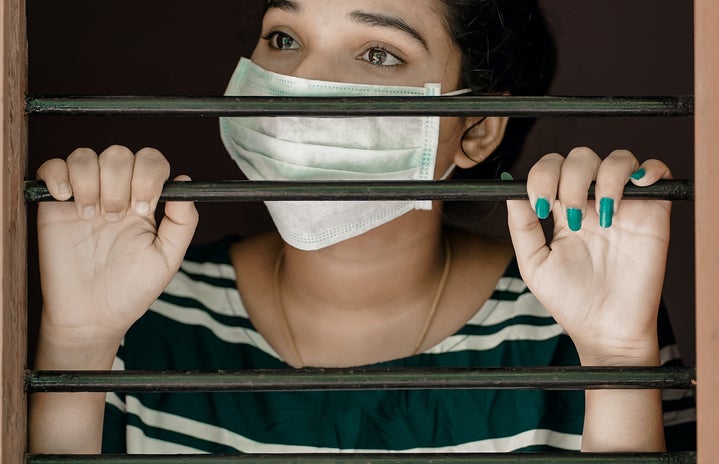I grew up in a small two-bedroom apartment with my rowdy family of five, constantly engulfed by noise. I never had time to myself in any capacity. I think this is why I’m more extroverted, in the sense that I get a lot of my energy by interacting with others. So, once the coronavirus pandemic hit, I was already struggling with being confined to my house. But, it wasn’t until I had to legitimately quarantine for two weeks that I really realized I needed to relearn how to be okay with just being by myself.
Due to a pressing family emergency, my dad was forced to travel to another state, and unfortunately he came back with COVID. In the short time that he had been interacting with the rest of us, one of my sisters had caught it as well. My family was incredibly lucky in that those of us who tested negative had access to another vacant location to quarantine in, where the three of us were able to isolate ourselves from those infected and begin our mandatory quarantine.

I was stuck in a bedroom in a house I barely knew, 70 miles away from everything I did know. Alone and with little to do, I was faced with the reality of being stuck with myself and my thoughts, and that alone feeling was suffocating.
I came to realize that sometime during the onset of the pandemic my day-to-day life events had turned into my distraction rather than my form of living. I was using work, classes, and friends to escape the pandemic reality. At the end of the day, I couldn’t stand the thought of being alone, and once that became my reality it almost paralyzed me. My body was depleted of motivation to talk to friends or to formulate any sort of structure in my day. I fell into a hole of self-pity, and I felt awful. It wasn’t until one good night of crying and a very-much-needed talk with my best friend that I finally made the decision to turn things around.
I started by looking for happiness in places that I had overlooked before. From the simple things like the way the sunlight was peaking through my bedroom window or a particularly delicious dinner, I actively tried harder to soak up my surroundings instead of only living inside my personal pity party. I filled the silence with all of my favorite music and stayed away from technology and social media. The stimulation I was searching for on my phone, I now turned to reading for. Getting lost in a story is probably the most therapeutic way to get over being alone, and a healthy way of getting lost in your head.
Another thing that really worked for me was getting myself ready every single day. There’s truly nothing that made me feel worse than being in my pajamas all day, yet I lacked the motivation to change into anything else. But after I finally made a pact to myself to get ready everyday, to put on an outfit and jewelry, and as alarming as it might sound, stay extremely on top of my personal hygiene, I felt exponentially better. I truly believe that if you look good you feel good, and it’s another way to find happiness in an otherwise dull cycle of nothing.

It took me completing all these little things to finally come to the most important realization of them all: that I am enough. I know my value to myself and the world, and I am enough. Learning to love being alone was more difficult than I ever thought possible, but it has made me feel more in-tune with myself than ever before.
I learned that loving alone time comes down to the love you have for yourself and the world around you. If you’re struggling with being alone, immerse yourself in the world around you. Notice the little things you weren’t looking for before, and find a sort of peace in the stagnancy. Everyone is different, so figure out what works for you and your mental health. Putting work into bettering yourself is always worth the effort, and is especially important in today’s context. Don’t be afraid to focus on yourself, cause you are completely worth the time.



